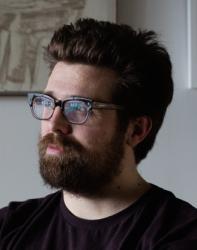
Earlier this year, Rebekka Rafnsdóttir received the Bette Howland Prize for Non-Fiction for her essay ‘A Girl on the Hunt.’ Rebekka, who resides in Brooklyn, is a merit-awarded graduate of the New School’s creative writing program. Her work has appeared in NY based publications such as H.O.W. Journal and A Public Space, and subsequently received praise from writer Rebecca Solnit. Despite praising the New School’s creative writing program, Rebekka maintains that the academic process can be treacherous to creativity.
“You have to make sure you’re able to hold onto your creative independence, avoiding dogmas and trends and ways of thinking that are only relevant within an academic context,” she says. “Sometimes you’ll meet people within academia who don’t care about any of that, and it makes the entire process worth it.”
Navigating the human experience
Currently, Rebekka primarily works in English, though she says that’s largely because of living in New York. “I believe different languages can provide different architectures of thought.” she says. “In English, I can dance between the various voices within myself. Personally, I don’t experience that same level of openness in Icelandic. I’m sure I’ll be able to overcome this feeling at some point, but there’s a lot of freedom in striving to find my voice in a foreign language. It provides me with a new framework to navigate my experience as a human being. I often feel robbed of melting into nature or other realities. It’s like I’m disconnected from everything that is because my corporeal existence is trapped within the confines of language.”

It is perhaps not surprising that Rebekka’s writing has an ethereal quality to it, as if attempting to band reader and text together by dipping into a shared sense of memory. “Being lost is such a lovely state of being,” she says. “I can’t write good material unless I forget time and space. Writing to me is more like dreaming than thinking. You can become anyone, do anything—you’re not bound by the material world. Everything becomes malleable with a pen in hand, and you discover previously unnoticed beauty around you.” She continues, laughing, “Writing doesn’t actually have that much to do with me. It seems to happen when I finally manage to move out of the way. I step aside and witness it happening.”
Language and the sublime
This type of unconscious writing, she says, is her attempt to get beyond language in her work—an attempt that she says she knows to be futile. “A big part of being human is coming to terms with the severance between you and nature; you and the sublime,” Rebekka muses. “I’m searching for that connection but consciousness robs me of it. I sometimes envy other creatures because they don’t possess language.”
Recently she has been branching into other forms of art to further develop that sense of connectedness. “I’m fascinated with the possibilities of expressing these ideas through cinema, to invoke feeling rather than understanding,” she explains. “Anything that goes beyond a linear, logical understanding fascinates me. The idea of having an impact on someone beyond the linguistic is exciting—to make something happen inside that is unlanguageable.”
She is adamant about this transformative power of writing, exclaiming, “Literature has the power to help us mature as sentient beings and yet we still have to fight for support of the arts. I’m not sure what that says about us.”
Buy subscriptions, t-shirts and more from our shop right here!

















